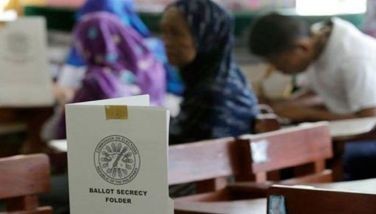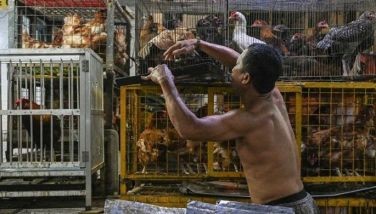Palace: Crime rate down

June 21, 2001 | 12:00am
Despite the recent occurrence of some high-profile crimes, Malacañang reported yesterday that the crime rate over the past five months went down by 10 percent compared to the same period last year.
The Philippine National Police (PNP) report was released as President Arroyo created a Cabinet Oversight Committee (COC) on internal security that will handle matters related to the various insurgency movements in the country.
Presidential Spokesman Rigoberto Tiglao, citing a report by the PNP, said index crimes from January to May this year dropped by 10 percent.
There were 30 kidnapping-for-ransom cases under the five-month-old Arroyo administration as against 48 last year under the watch of jailed former President Joseph Estrada, Tiglao reported.
He noted that the biggest drop was in car thefts, which went down to 762 from January to May compared to 1,635 during the same period last year  a decline of over 50 percent.
Mrs. Arroyo designated Executive Secretary Alberto Romulo as chairman of the oversight committee, with Defense Secretary Angelo Reyes as vice chairman.
The President earmarked P20 million as initial funding for the COC, which has been tasked to study and review matters pertaining to the government’s peace initiatives with the National Democratic Front (NDF), the political arm of the Communist Party of the Philippines, and the secessionist Moro Islamic Liberation Front (MILF).
The creation of the COC, made through the issuance of Executive Order 21, limited the responsibility of Cabinet Cluster E on national security and developments to matters concerning external security issues.
Mrs. Arroyo said the government’s response to the insurgency problem "requires a holistic approach" to cover the political, economic, psycho-social and security aspects of the insurgency problem.
As envisioned, the COC will coordinate and integrate peace and development "to enhance and institutionalize the effectiveness of the holistic approach to address the insurgency problems at the national, sub-national and local levels."
Named members of the COC were Interior and Local Government Secretary Jose Lina Jr., Vice President and Foreign Affairs Secretary Teofisto Guingona Jr., Justice Secretary Hernando Perez, Agrarian Reform Secretary Hernani Braganza, Public Works and Highways Secretary Simeon Datumanong, Education Secretary Raul Roco, Social Welfare Secretary Dinky Soliman, Health Secretary Manuel Dayrit Jr., National Security Adviser Roilo Golez, Economic Planning Secretary Dante Canlas, Press Secretary Noel Cabrera, Anti-Poverty Commission chairman Ging Deles, Presidential Adviser on Peace Process Eduardo Ermita, Presidential Adviser for Regional Development Paul Dominguez, and Commission on Human Rights chairman Aurora Recinas.
Meanwhile, Philippine National Police (PNP) chief Director General Leandro Mendoza hailed the creation of a National Anti-Crime Commission (NACC) as a "manifestation of a strong political will to break the backbone of organized crime groups and transnational crime syndicates through a well-orchestrated, inter-agency, total war approach."
Through the NACC, the government now enjoys inter-operability among the PNP, the Armed Forces of the Philippines, the National Bureau of Investigation and other law enforcement agencies, Mendoza said.
He congratulated Secretary Perez who was designated head of the NACC.
As a component of the NACC, the PNP looks forward to an improved partnership with other law enforcement agencies, Mendoza said.
"We are taking a concrete step to lay the foundation for economic prosperity through improved peace and order, and national security," he said.
Perez, for his part, said the NACC will focus its attention on heinous crimes, leaving to the regular law enforcement agencies the general campaign against criminality.
Perez said going after illegal gambling such as jueteng is not a job for the NACC.
"We will concentrate first on kidnapping, robbery, illegal drug trafficking and other organized crimes. We shall limit ourselves to heinous crimes only, and crimes by organized syndicates," the secretary added.
Perez admitted that the President had a change of heart in designating him NACC head instead of Executive Secretary Alberto Romulo who was named earlier to the post.
Tiglao said Mrs. Arroyo has yet to sign the executive order creating the NACC.
Dismayed over the apparent breakdown of peace and order in the country, the militant Volunteers Against Crime and Corruption (VACC) threatened to withdraw all criminal cases it filed before the courts, and called for the creation of an alternative justice system.
"As far as we are concerned, public confidence in our criminal justice system is slowly being eroded. The VACC denounces the rampant corruption and bureaucratic red tape plaguing the judiciary. The situation of justice in the Philippines is that money and influence have proven effective in winning a case. That leaves the poor and the indigent victim doubly victimized," VACC chairman Dante Jimenez said.
He added that Congress has churned out voluminous laws that have remained idle due to lack of funds to implement them.
He urged the government to implement reforms in the justice system within six months, or else they would withdraw all their cases from the courts. - With reports from Christina Mendez, Mike Frialde
The Philippine National Police (PNP) report was released as President Arroyo created a Cabinet Oversight Committee (COC) on internal security that will handle matters related to the various insurgency movements in the country.
Presidential Spokesman Rigoberto Tiglao, citing a report by the PNP, said index crimes from January to May this year dropped by 10 percent.
There were 30 kidnapping-for-ransom cases under the five-month-old Arroyo administration as against 48 last year under the watch of jailed former President Joseph Estrada, Tiglao reported.
He noted that the biggest drop was in car thefts, which went down to 762 from January to May compared to 1,635 during the same period last year  a decline of over 50 percent.
Mrs. Arroyo designated Executive Secretary Alberto Romulo as chairman of the oversight committee, with Defense Secretary Angelo Reyes as vice chairman.
The President earmarked P20 million as initial funding for the COC, which has been tasked to study and review matters pertaining to the government’s peace initiatives with the National Democratic Front (NDF), the political arm of the Communist Party of the Philippines, and the secessionist Moro Islamic Liberation Front (MILF).
The creation of the COC, made through the issuance of Executive Order 21, limited the responsibility of Cabinet Cluster E on national security and developments to matters concerning external security issues.
Mrs. Arroyo said the government’s response to the insurgency problem "requires a holistic approach" to cover the political, economic, psycho-social and security aspects of the insurgency problem.
As envisioned, the COC will coordinate and integrate peace and development "to enhance and institutionalize the effectiveness of the holistic approach to address the insurgency problems at the national, sub-national and local levels."
Named members of the COC were Interior and Local Government Secretary Jose Lina Jr., Vice President and Foreign Affairs Secretary Teofisto Guingona Jr., Justice Secretary Hernando Perez, Agrarian Reform Secretary Hernani Braganza, Public Works and Highways Secretary Simeon Datumanong, Education Secretary Raul Roco, Social Welfare Secretary Dinky Soliman, Health Secretary Manuel Dayrit Jr., National Security Adviser Roilo Golez, Economic Planning Secretary Dante Canlas, Press Secretary Noel Cabrera, Anti-Poverty Commission chairman Ging Deles, Presidential Adviser on Peace Process Eduardo Ermita, Presidential Adviser for Regional Development Paul Dominguez, and Commission on Human Rights chairman Aurora Recinas.
Meanwhile, Philippine National Police (PNP) chief Director General Leandro Mendoza hailed the creation of a National Anti-Crime Commission (NACC) as a "manifestation of a strong political will to break the backbone of organized crime groups and transnational crime syndicates through a well-orchestrated, inter-agency, total war approach."
Through the NACC, the government now enjoys inter-operability among the PNP, the Armed Forces of the Philippines, the National Bureau of Investigation and other law enforcement agencies, Mendoza said.
He congratulated Secretary Perez who was designated head of the NACC.
As a component of the NACC, the PNP looks forward to an improved partnership with other law enforcement agencies, Mendoza said.
"We are taking a concrete step to lay the foundation for economic prosperity through improved peace and order, and national security," he said.
Perez, for his part, said the NACC will focus its attention on heinous crimes, leaving to the regular law enforcement agencies the general campaign against criminality.
Perez said going after illegal gambling such as jueteng is not a job for the NACC.
"We will concentrate first on kidnapping, robbery, illegal drug trafficking and other organized crimes. We shall limit ourselves to heinous crimes only, and crimes by organized syndicates," the secretary added.
Perez admitted that the President had a change of heart in designating him NACC head instead of Executive Secretary Alberto Romulo who was named earlier to the post.
Tiglao said Mrs. Arroyo has yet to sign the executive order creating the NACC.
Dismayed over the apparent breakdown of peace and order in the country, the militant Volunteers Against Crime and Corruption (VACC) threatened to withdraw all criminal cases it filed before the courts, and called for the creation of an alternative justice system.
"As far as we are concerned, public confidence in our criminal justice system is slowly being eroded. The VACC denounces the rampant corruption and bureaucratic red tape plaguing the judiciary. The situation of justice in the Philippines is that money and influence have proven effective in winning a case. That leaves the poor and the indigent victim doubly victimized," VACC chairman Dante Jimenez said.
He added that Congress has churned out voluminous laws that have remained idle due to lack of funds to implement them.
He urged the government to implement reforms in the justice system within six months, or else they would withdraw all their cases from the courts. - With reports from Christina Mendez, Mike Frialde
BrandSpace Articles
<
>
- Latest
- Trending
Trending
Latest
Trending
Latest
Recommended































